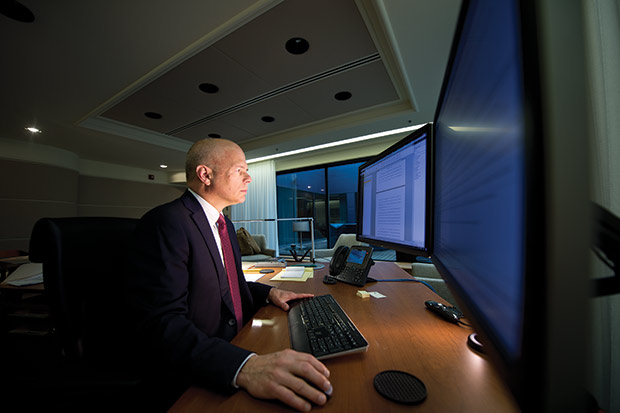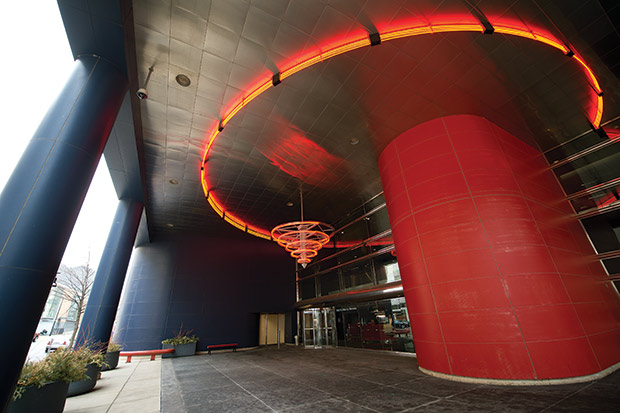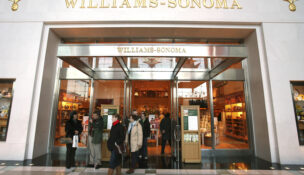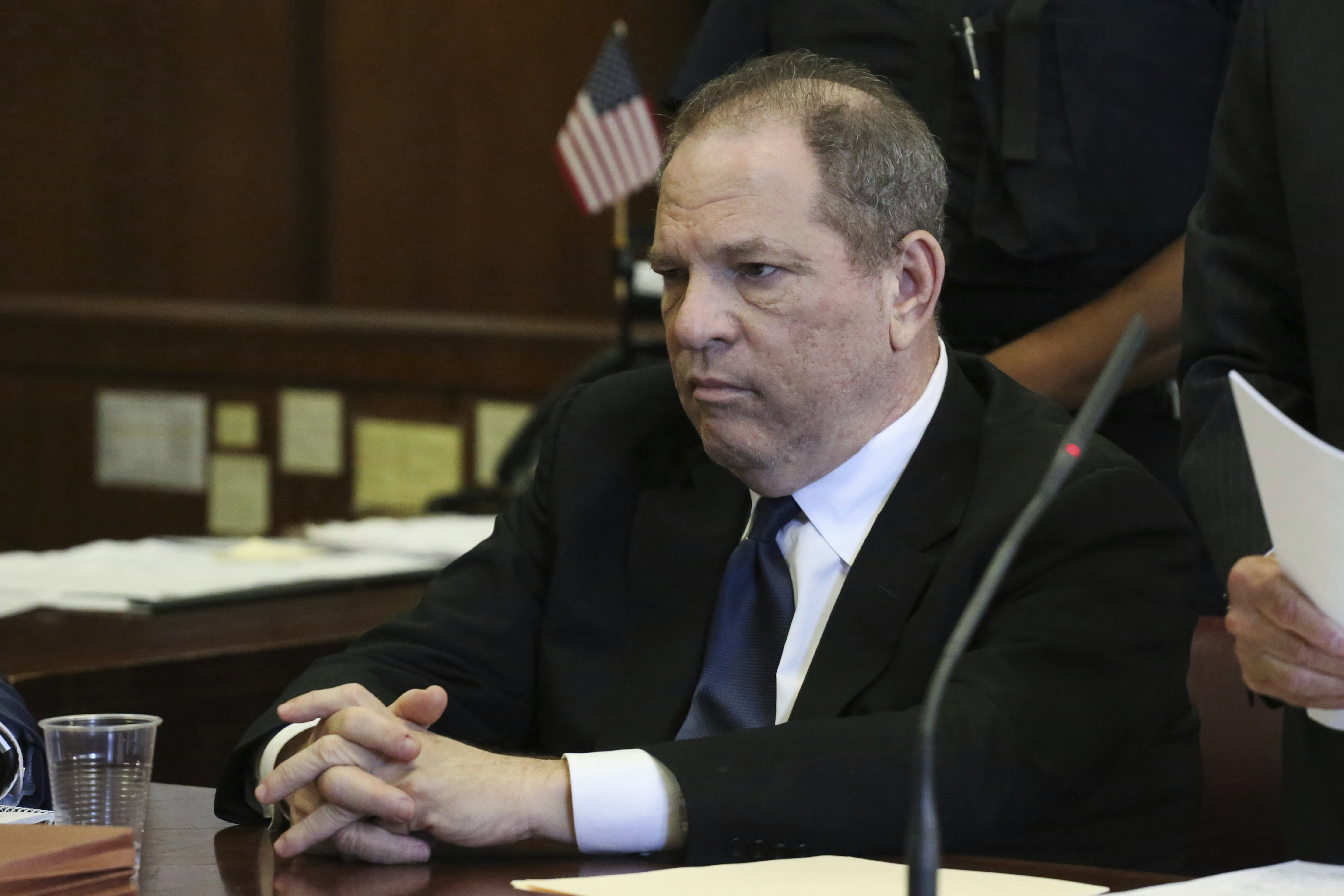On the rocket docket: Western District chief judge offers up tips for success
By: Erika Strebel, [email protected]//May 8, 2018//
On the rocket docket: Western District chief judge offers up tips for success
By: Erika Strebel, [email protected]//May 8, 2018//

Although the Western District of Wisconsin may be known for its speed in moving along cases, that doesn’t necessarily mean lawyers need to be rocket scientists to practice there.
For lawyers working in the district, Chief Judge James Peterson has some simple advice touching on everything from electronic filing to what to leave out of briefs.
On the topic of electronic filing, for instance, Peterson said lawyers should not assume that just because this sort of filing has been required in federal courts since 2005 that paper is a thing of the past in the Western District. For judges like him, at least, paper remains very much in use.
Especially when reviewing motions and pleadings, Chief Judge James Peterson and his fellow judges find themselves relying on both paper and computers.
Peterson, who took the bench in 2014 after being appointed by President Barack Obama, said that when he takes his work home—which happens fairly often—it will all be on paper. He also tends to prefer paper for reading straightforward motions.
“If it gets to be a more complex case, I’m going to take a deeper dive into it,” Peterson said. “So I’ll have the briefs. I’ll have the proposed findings of fact. And then I will sit at the computer, usually, and drill down to read the deposition testimony or the affidavits or the expert reports that are cited. And I’ll see whether they really say what they’re supposed to say.”
But even though practitioners can’t really control how federal judges read their briefs, they still have plenty of say over their contents.
For lawyers who are eager to make their submissions as effective as possible, Peterson had some simple advice.
The Western District, he noted, hasn’t got extensive formal rules. For new practitioners who want to get a sense of how the court operates, Peterson suggested they review the practice expectations curated by the Western District of Wisconsin Bar Association.
Those—which are compiled by the association’s Committee on Rules, Practice and Procedure—can be found online. Peterson also suggested practitioners find cases that are similar to theirs and read the preliminary pretrial-conference orders issued in them.
For advice on typography, he recommended practitioners look to the seven-page handbook the Seventh Circuit Court of Appeals has issued on the topic.
He said that even though he is always looking for ways to make improvements, the vast majority of attorneys who appear in federal court are extremely capable and a pleasure to work with – especially those in the Madison bar.
“It’s partly because local attorneys know what we want here,” he said. “But also, they’re just good common-sense, talented attorneys.”

Expert reports are important
One step Peterson takes regularly is to read parties’ expert reports, which are often important in summary-judgment motions. They also have a big role to play under Rule 26 of the Federal Rules of Civil Procedure, especially as those rules are applied in the Seventh Circuit. Peterson noted that only information that is disclosed in expert reports is allowed to come out at trial.
Peterson called on attorneys to make sure their reports are readable.
“They’re not just a source of little snippets that you can put in your brief,” he said. “If I am going to sit down and read that expert report, the expert should really be teaching me about the issue, and I should be able to make sense out of the position and understand it.”
Concentrating on the merits
Something to avoid, he said, is trashing the opposing party in motions or pleadings.
“I would like to think this is an easy tip to follow,” Peterson said. “But we fairly regularly get really, kind of, mean-spirited, sarcastic briefs in which counsel is really expressing a great deal of outrage at the conduct of the other side.”
Peterson has talked about this sort of behavior with clerks and other judges and found that virtually no one likes it.
“Judges really hate that,” he said. “We really try to decide the case on the merits. That’s really what we’re interested in. I’m not going to decide a case against you because you have a sarcastic mean-spirited brief. But it really is counterproductive.”
Don’t overstate authority
Another thing to be careful about is overstating the legal authority for an argument. Be honest about the meaning of the authorities you cite to a judge, Peterson said. If you plan to argue that a particular case can be used for a legal rule, you had better make sure it really can.
“If you overstate your authority, we’re going to note that,” said Peterson. “And then next time you come to court with another brief, we’re going to be a little suspicious of you.”
Take a step back
Peterson also suggested that practitioners give their briefs what he calls a “review for readability.” This will help them make sure their arguments will make sense to someone who is coming to the subject quite possibly for the first time. He said he can easily lose sight of the big picture if he is forced to pick through a heap of details.
Peterson says he tends to believe that every case has an “underlying simplicity.” Most cases, he said, end up getting resolved in accordance with basic principles. He’ll often find that one party’s goal is to help him uncover that underlying simplicity, whereas the other party is trying to complicate matters.
“The party that helps guide me to the underlying simplicity usually has the better chance of winning the case,” Peterson said.
Peterson encourages lawyers to practice in the Western District, noting that enormous amounts of experience are not required.
“New lawyers can do a great job at the federal courts,” he said. “Pay attention. Read the rules, follow the rules and do a careful job and honest job in writing your briefs. Try not to sound like a lawyer.”
Legal News
- Questions of transparency, leadership responsibility linger over State Bar trust
- Firm demands $4.3M in dispute with Wisconsin client
- Chesebro among those charged with interfering in 2020 election
- Williams-Sonoma must pay almost $3.2 million for violating FTC’s ‘Made in USA’ order
- Harvey Weinstein due back in court, while a key witness weighs whether to testify at a retrial
- Protests erupt on college campuses throughout Midwest, and U.S. over war in Gaza
- Flight attendant indicted in attempt to record minor in airplane bathroom
- Wisconsin attorney loses law license, ordered to pay $16K fine
- Former Wisconsin police officer charged with 5 bestiality felony counts
- Judge reject’s Trump’s bid for a new trial in $83.3 million E. Jean Carroll defamation case
- Dozens of deaths reveal risks of injecting sedatives into people restrained by police
- The Latest: Supreme Court arguments conclude in Trump immunity case
WLJ People
- Power 30 Personal Injury Attorneys – Russell Nicolet
- Power 30 Personal Injury Attorneys – Benjamin Nicolet
- Power 30 Personal Injury Attorneys – Dustin T. Woehl
- Power 30 Personal Injury Attorneys – Katherine Metzger
- Power 30 Personal Injury Attorneys – Joseph Ryan
- Power 30 Personal Injury Attorneys – James M. Ryan
- Power 30 Personal Injury Attorneys – Dana Wachs
- Power 30 Personal Injury Attorneys – Mark L. Thomsen
- Power 30 Personal Injury Attorneys – Matthew Lein
- Power 30 Personal Injury Attorneys – Jeffrey A. Pitman
- Power 30 Personal Injury Attorneys – William Pemberton
- Power 30 Personal Injury Attorneys – Howard S. Sicula











